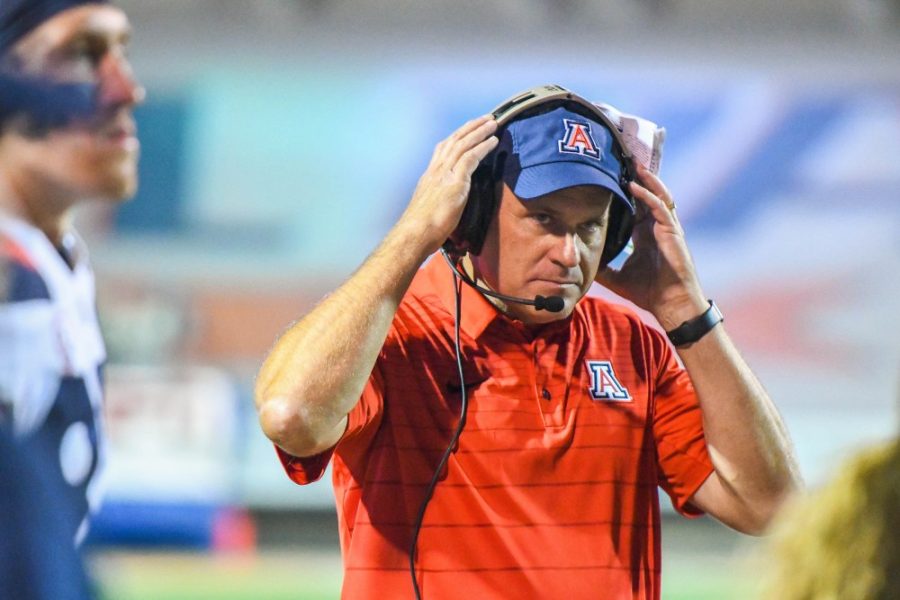The University of Arizona’s reputation as a respected institution of higher learning is in free fall.
From federal investigations into pay-for-play for the men’s basketball team and the dismissal of former basketball player Elliot Pitts following sexual misconduct, to claims against the university surrounding former Arizona running back Orlando Bradford and accusations against former UA assistant track and field coach Craig Carter, to the most recent harassment accusations against former football head coach Rich Rodriguez, the university continues to make the kind of national headlines no one wants to see their school associated with.
Although the UA eventually fired Rodriguez on Jan. 2 following an investigation by law firm Cohen Dowd Quigley, the decision to let him go had reportedly been made days earlier. The law firm began the investigation after a former employee alleged sexual harassment by Rodriguez in October of last year.
According to the former employee’s recent notice of claim against Rodriguez, she had attempted numerous times to address the harassment through university channels only to be rebuffed and silenced each time.
No one will ever know everything that happened between Rodriguez and his accuser except the two of them, but the university must work to determine if a culture of not addressing harassment accusations — and even encouraging such behavior — exists at the UA, and specifically in the athletics department.
RELATED: Editorial: The UA athletics department needs to directly address sexual misconduct
An outside investigation, one not protected by attorney-client privilege or funded by tuition/taxpayer dollars, must take place in order to expose any potential institutional problems, from the culture to reporting protocols, and examine methods for addressing inappropriate or harmful actions.
UA President Dr. Robert Robbins and Director of Athletics Dave Heeke — both on the job less than a year — expressed a desire to preserve the “core values” of the university in their statement announcing Rodriguez’s dismissal. Robbins later said in an interview that “we’re just not going to have any toleration of sexual harassment.”
Now is the time to live up to those words.
If the types of behavior or culture alleged truly do exist, then the UA must act accordingly. Robbins and Heeke should call for a truly independent, open review into these claims, and the sooner the better.
One group that could conduct such an examination is the UA’s accrediting body, the Higher Learning Commission. Although the HLC typically deals with matters related to faculty certification and academic standards, an investigation into matters similar to what are currently claimed against the university has recent, local precedent.
In 2013, Pima Community College faced claims of harassment against its then-chancellor from several women, as well as accusations of a “culture of fear” that prevented administrators and the college’s governing body from adequately addressing the allegations.
After hundreds of interviews with employees, students and members of the public conducted by educators and other experts, the HLC placed the college on probation. PCC then had two years to demonstrate to its accreditor that it was working to improve the culture of the institution, or risk losing federal funding and recognition.
The process required several progress reports to the HLC and follow-up interviews, all done in the public eye, with all documents available for anyone to read, scrutinize and comment on before final approval. Those that were interviewed had their identities protected in order to prevent retaliation.
Pima CC had its probation lifted in 2015, but it had to continue showing progress until about a year ago, when the final sanctions were lifted after it displayed it had made significant progress to address the myriad issues found during the HLC’s reviews.
The HLC is the accrediting body for both PCC and the UA.
RELATED: Arizona fires football head coach Rich Rodriguez
The UA will not be able to sweep away the questions surrounding its athletic department — and the way administration has handled these issues — without a comprehensive review that is open to the public and conducted by an impartial overseer like the HLC.
At least one football recruit has already de-committed from the UA following Rodriguez’s dismissal, and a cursory browsing of social media reveals the current chatter surrounding the university is anything but positive.
Even if the university conducts its own audit, which this publication called for more than six months ago in the wake of the Carter scandal, the damage has been done. Few people would trust the university’s investigation, especially if little or no wrongdoing were found.
Instead, Robbins, Heeke and anyone who values the UA’s mission and seeks to truthfully address issues the university is struggling to control, should welcome an independent, transparent review, regardless of the consequences.
The reputation of the UA itself may very well depend on it.
Editorials are determined by the Daily Wildcat Opinions Board and are written by its members. They are Editor-in-chief Courtney Talak, Opinions Editor Andrew Paxton, Content Editor Marissa Heffernan, Engagement Editor Saul Bookman and Arts & Life Editor Pascal Albright.
Follow the Daily Wildcat on Twitter









